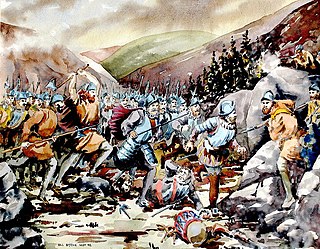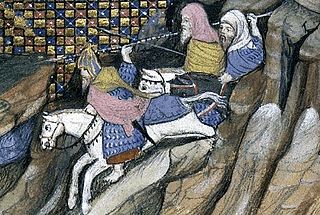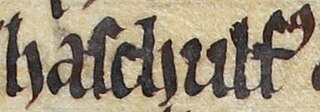Related Research Articles

Leinster is one of the four provinces of Ireland, in the southeast of Ireland.
Diarmait Mac Murchada, was King of Leinster in Ireland from 1127 to 1171. In 1167, he was deposed by the High King of Ireland, Ruaidrí Ua Conchobair. To recover his kingdom, Mac Murchada solicited help from King Henry II of England. His issue unresolved, he gained the military support of the Richard de Clare, 2nd Earl of Pembroke, thus initiating the Anglo-Norman invasion of Ireland.

The Battle of Glenmalure took place in Ireland on 25 August 1580 during the Desmond Rebellions. A Catholic army of united Irish clans from the Wicklow Mountains led by Fiach MacHugh O'Byrne and James Eustace, 3rd Viscount Baltinglass of the Pale, defeated an English army under Arthur Grey, 14th Baron Grey de Wilton, at Clan O'Byrne's mountain stronghold of Glenmalure.
Carrickmines Castle is an archaeological site in Carrickmines, County Dublin, in eastern Ireland. The castle was built in the Middle Ages to protect the English-ruled Pale around Dublin. The mostly subsurface ruins lay in the path of the M50 motorway, completed in 2005. Sections of the medieval walls and some sections of the castle's defensive structures were preserved within or under M50 roundabouts.

Art Óg Mac Murchadha Caomhánach was an Irish king who is generally regarded as the most formidable of the later kings of Leinster. He revived not only the royal family's prerogatives, but also their lands and power. During his 42-year reign, he dominated the Anglo-Norman settlers of Leinster. His dominance of the province and its inhabitants, both Gaelic and Hiberno-Norman, was deemed sufficiently detrimental to the colony that Richard II of England spent much of the years 1394 and 1395 sparring with him. While MacMurrough-Kavanagh did eventually submit to Richard, he renounced this fealty on Richard's departure and made much of his kingdom a death trap for any invading English or Anglo-Irish forces. The Crown accordingly dealt with him cautiously and he was granted an amnesty in 1409.

Fiach mac Aodha Ó Broin was Chief of the Name of Clann Uí Bhroin and Lord of Ranelagh during the Elizabethan wars against the Irish clans.
The Leinster Council is a provincial council of the Gaelic Athletic Association sports of hurling, Gaelic football, camogie, rounders and handball in the province of Leinster. The Leinster Council has been partnered with the European County Board to help develop Gaelic Games in Europe. Leinster Council's main contribution to this goal is the provision of referees.
The Uí Ceinselaig, from the Old Irish "grandsons of Cennsalach", are an Irish dynasty of Leinster who trace their descent from Énnae Cennsalach, a supposed contemporary of Niall of the Nine Hostages. Énda was said to be a grandson of Bressal Bélach and a first cousin of Dúnlaing mac Énda Niada, eponymous ancestor of the rival Uí Dúnlainge.

The O'Byrne Cup is a Gaelic football competition organised by the Leinster GAA and first staged in 1954. The competition has been sponsored by Dioralyte since 2024.

UCD GAA or University College Dublin Gaelic Athletic Association club is a Dublin based Gaelic games club in University College Dublin. The UCD hurling club was founded in 1900 and boasted the mottos "Ad Astra" and "Cothrom Féinne". The first team was an amalgamation of students from UCD and Cecilia St. Although UCD had been playing Gaelic football unofficially since 1900, the official club history began in the season of 1911/1912.
The 2007 O'Byrne Cup was a Gaelic football competition played by the teams of Leinster GAA. The competition differs from the Leinster Senior Football Championship as it also features further education colleges.

Ascall mac Ragnaill meic Torcaill, also known as Ascall Mac Torcaill, was the last Norse-Gaelic king of Dublin. He was a member of the Meic Torcaill, a Dublin family of significance since the early twelfth century.
Domnall Gerrlámhach, also known as Domnall Gerrlámhach Ua Briain, Domnall mac Muirchertaig, and Domnall Ua Briain, was an obscure twelfth-century Uí Briain dynast and King of Dublin. He was one of two sons of Muirchertach Ua Briain, High King of Ireland. Domnall's father appears to have installed him as King of Dublin in the late eleventh- or early twelfth century, which suggests that he was his father's successor-designate. Although Domnall won a remarkable victory in the defence of the Kingdom of Dublin in the face of an invasion from the Kingdom of Leinster in 1115, he failed to achieve the successes of his father. After his final expulsion from Dublin at the hands of Toirdelbach Ua Conchobair, King of Connacht, and the death of his father, Domnall disappears from record until his own death in 1135. He was perhaps survived by two sons.
Diarmait mac Énna meic Murchada was an early twelfth-century ruler of the kingdoms of Leinster and Dublin.
Events from the year 1115 in Ireland.
Énna Mac Murchada, or Enna Mac Murchada, also known as Énna mac Donnchada, and Énna mac Donnchada mic Murchada, was a twelfth-century ruler of Uí Chennselaig, Leinster, and Dublin. Énna was a member of the Meic Murchada, a branch of the Uí Chennselaig dynasty that came to power in Leinster in the person of his paternal great-grandfather. Énna himself gained power following the death of his cousin Diarmait mac Énna. Throughout much of his reign, Énna acknowledged the overlordship of Toirdelbach Ua Conchobair, King of Connacht, although he participated in a failed revolt against the latter in 1124 before making amends. When Énna died in 1126, Toirdelbach successfully took advantage of the resulting power vacuum.
The Meic Torcaill, also known as the Meic Turcaill, the Mac Torcaill dynasty, the Mac Turcaill dynasty, and the Mac Turcaill family, were a leading Norse-Gaelic family in mediaeval Dublin. The kindred produced several eminent men and kings of Dublin before the Norman conquest of the kingdom in 1170. Afterwards the family fell from prominence, losing possession of their extensive lands in the region. In time the Meic Torcaill lost precedence to other Dublin families, such as the Harolds and Archbolds.
The 2020 O'Byrne Cup was a Gaelic football tournament played by county teams of Leinster GAA in December 2019 and January 2020.
The 2022 O'Byrne Cup was a Gaelic football tournament played by eleven county teams of Leinster GAA in January 2022; Kilkenny did not take part. Longford were the holders.